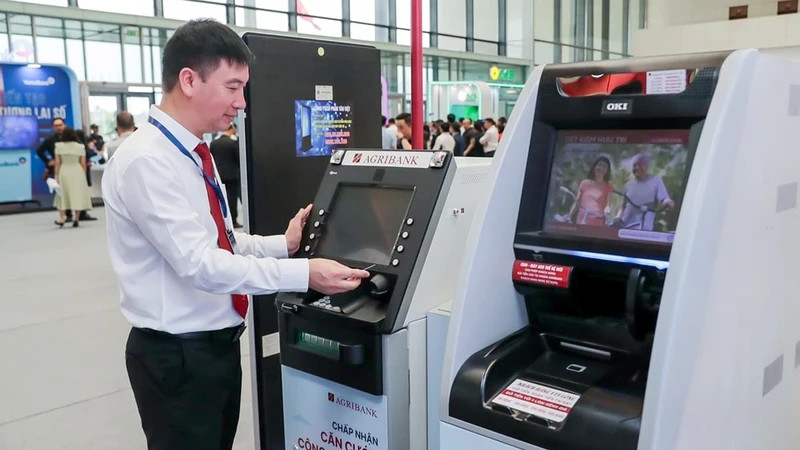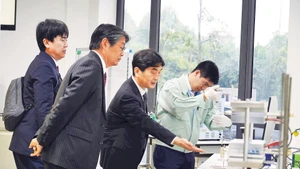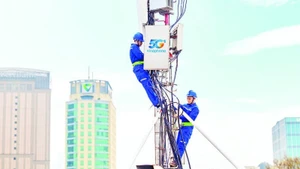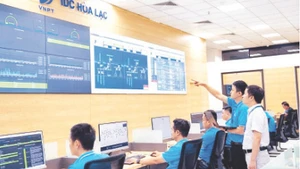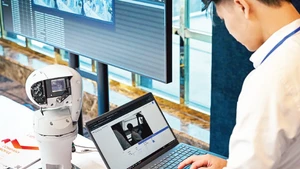According to Director of FIS Global Stephen Peters, the e-wallet is the leading eCom payment method with a rate of 36%, followed by 31% of POS payments in 2023 and expected to increase to 49% (eCom payments) and 50% (POS payments) by 2027. Meanwhile, the use of cash and card payments is decreasing (for both credit and debit).
Biometric payment trends
Account-to-account (A2A) payments are also growing rapidly. According to Stephen Peters, although the A2A method has difficulty replacing cards in card-intensive markets, such as the UK and the US, in many other markets, merchants often prefer low-cost payment methods like A2A. In Vietnam, the payment rate according to A2A in 2023 reached 20%.
Along with that, other potential new payment trends are emerging, one of which is biometric payment (Biometric Pay).
In the world, Japan is a pioneer in using biometric payment technology. Payment systems using fingerprints and faces have been widely deployed in stores, restaurants, ATMs and shopping malls in Japan. China is also becoming a large market for Biometric Pay, with millions of users daily through mobile payment applications such as Alipay, WeChat Pay, and Union Pay.
Deputy General Director of Epay Service Joint Stock Company, Dang Thanh Tuan, said online transactions are increasing and Vietnamese consumers are increasingly interested in protecting personal and financial information. Therefore, they increasingly prefer safer payment methods such as biometric payments. With great demand from creating a completely new form of payment - biometric payment, and identity authentication applications, Epay has brought comprehensive solution proposals from authentication devices, to authentication technology solutions, accurate identification, and fast, convenient and safe payment support, through face, fingerprint, palm, and iris.
In addition, Epay has successfully deployed a solution for identity authentication and non-cash payment throughout the medical field, from reception to pre-clinical payment, allowing people and medical facilities to reduce administrative procedures during medical examination and treatment, and reduce waiting time from 7-10 minutes/procedure to less than 1 minute. According to a report from Saint Paul Hospital, Epay’s cashless payment and identity authentication kiosk solution has welcomed more than 50,000 registrations for medical examinations, taking order numbers, and paying fees. Along with Saint Paul Hospital, Epay’s healthcare solutions are also being deployed and tested in many other hospitals nationwide.
Collecting data safely and effectively
Identity authentication and biometric payments are new trends, applied in many major countries. This trend will bring convenient payment experiences to users. However, forms of payment support using fingerprints, faces, etc. in Vietnam have not yet been authenticated and identified with the National Population Database system, so there are still risks for banks and users.
Epay is one of the units certified by the National Population Data Centre (Police Department for Administrative Management of Social Order, the Ministry of Public Security) as a unit providing products and services to authenticate citizen identification cards with chips according to Decision No.3103 dated March 31, 2023, and at the same time be licensed by the State Bank of Vietnam to provide 4/6 payment intermediary services according to Decision No.54 dated May 24, 2019. Epay has researched and applied Biometric Pay payment technology and will soon be accessible in stores, giving consumers a quick payment experience.
However, according to the representative of Epay’s leaders, the application of this technology still has some challenges, such as the legal framework for Biometric Pay in Vietnam not yet being completed. The important issue that must be considered and resolved is to have clear regulations on the collection, storage and use of biometric data, to ensure customer privacy. Besides, changing user awareness and getting used to new payment habits is also an issue that needs attention, to make biometric payment a new, modern trend.
Many experts said that with the efforts of participating parties, Biometric Pay promises to become a popular payment method in the future in Vietnam, contributing to promoting digital economic development and improving the quality of life for people. According to data from the Ministry of Public Security, to date, the Ministry has issued 86 million chip-embedded citizen identification cards, collected more than 1 million electronic identification records, and activated 53.88 million accounts; there are eight utilities serving people with 29.4 million visitors to VNeID.
In the near future, the Ministry of Public Security will announce 26 new features on VNeID, including four features linked to the banking industry and move towards making VNeID identification accounts the only method of accessing and performing administrative procedures on the Public Service Portal in July 2024, to meet people's needs. Lieutenant General Nguyen Duy Ngoc, Deputy Minister of Public Security, affirmed that the Ministry of Public Security will continue to work with professional units of the State Bank of Vietnam and the Ministry of Information and Communications to both provide services and ensure safety, and deploy optimal solutions to protect personal data during connection.
